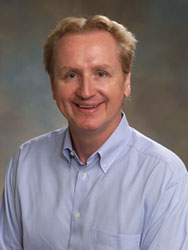Scripps Research Institute Biologist Named UCSD Dean of Biological Sciences
September 17, 2007
By Kim McDonald

Steve A. Kay
Photo Credit: TSRI
Steve A. Kay, a pioneer in the biology of circadian rhythms at The Scripps Research Institute in La Jolla, has been named dean of the Division of Biological Sciences at the University of California, San Diego.
He assumes his new administrative position today, replacing Suresh Subramani, a professor of biological sciences who served as interim dean during the past year, and Eduardo Macagno, who was the founding dean of the division from 2001 to 2006.
Kay, who will also hold the prestigious Richard C. Atkinson chair in biological sciences, named after the former UC president, was formerly a professor of cell biology at The Scripps Research Institute, chair of its Department of Biochemistry and director of its Institute for Childhood and Neglected Diseases, where he was a faculty member from 1996 to 2007. He also holds an appointment as adjunct professor in UCSD's Department of Psychiatry.
As the vice chairman of the Scripps Florida Steering Committee, Kay co-authored the Scripps Florida business plan that led to the appropriation of more than $500 million in state and local funds to establish a campus of TSRI in Palm Beach County, Florida. While on leave from TSRI, he became the principal founder, chief technology officer and senior vice president of Phenomix Corporation. From 1999 to 2002, he served as the director of discovery research at the Genomics Institute of the Novartis Research Foundation, where he built a large department of researchers applying functional genomics technology to biomedical research and drug discovery.
"His experience as a strong administrative leader, scholar and researcher will be invaluable for the Division of Biological Sciences and the campus," said Marye Anne Fox, chancellor of UCSD. "Dr. Kay has extraordinary interpersonal skills and is an imaginative and energetic partner in educational and scientific enterprises. These qualities will serve the division well with its joint appointments and collaborative activities with community partners such as the Salk Institute for Biological Sciences, the Burnham Institute and TSRI."
"The Torrey Pines mesa has become one of the premier areas for science in the world," said Kay. "And it is poised to leapfrog Boston and the Bay area in competing for major research centers in the life sciences. This is why I'm staying on the mesa and one of the reasons I'm coming to UCSD, which is the beating heart of the mesa. We're going to continue to work more closely with our neighboring institutions to build large scale projects, which will lift up the entire research and education enterprise of the mesa. I think that's incredibly important."
Born in the United Kingdom, Kay received both his bachelor's degree and his Ph.D. in biochemistry from the University of Bristol. He was a member of the faculty of the biology department and the medical school at the University of Virginia and also held a faculty appointment at The Rockefeller University in New York. He has received several noteworthy academic awards, including a Keck Foundation Faculty Award and the Honma Prize for Life Sciences in 1999. His work was cited in Science magazine's "Breakthroughs of the Year" consecutively in 1997 and 1998 and again in 2002.
A molecular geneticist, Kay will continue his research at UCSD, which is focused on the molecular and cellular basis of circadian rhythms in plants, animals and humans. His discoveries have expanded our knowledge of the molecular components and mechanism of action of circadian clocks, ranging from understanding the mechanism of day length sensing in plants to daily behavioral controls in mammals.
Media Contact: Kim McDonald, (858) 534-7572
